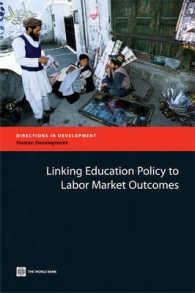- ホーム
- > 洋書
- > 英文書
- > Literary Criticism
Full Description
Capital Letters sheds new light on how literature has dealt with society's most violent legal institution, the death penalty. It investigates this question through the works of three major French authors with markedly distinct political convictions and literary styles: Victor Hugo, Charles Baudelaire, and Albert Camus.
Working at the intersection of poetics, ethics, and law, Ève Morisi uncovers an unexpected transhistorical dialogue on both the modern death penalty and the ends and means of literature after the French Revolution. Through close textual analysis, careful contextualization, and the critique of violence forged by Giorgio Agamben, Michel Foucault, and RenÉ Girard, Morisi reveals that, despite their differences, Hugo, Baudelaire, and Camus converge in questioning France's humanitarian redefinition of capital punishment dating from the late eighteenth century.
Conversely, capital justice leads all three writers to interrogate the functions, tools, and limits of their art. Capital Letters shows that the key modern debate on the political and moral responsibility, or autonomy, of literature crystallizes around the death penalty. Inflecting traditional modes of representation and writing self-reflexively or self-critically, Hugo, Baudelaire, and Camus unsettle the commonly accepted divide between strictly aesthetic and politically committed writing. Form, rather than overtly political argument, at once conveys an ethical critique of justice and reflects on the possibilities, and duties, of literature.







